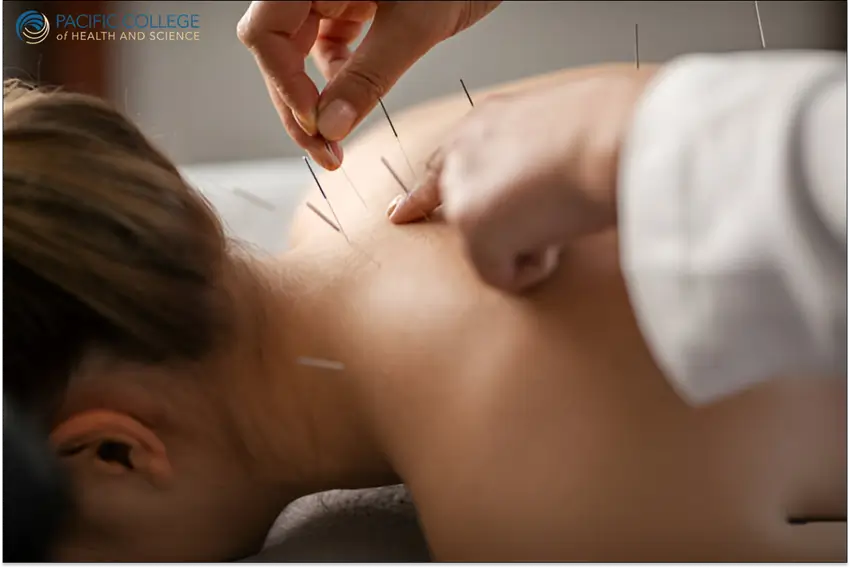Before answering the question of how to become an acupuncturist, first ask yourself: why become an acupuncturist? Acupuncture is one element within the scope of Chinese medicine, which itself is a comprehensive system that examines and treats the entire body. As an acupuncturist, you’ll use Chinese medicine techniques to help patients manage their pain, improve their overall health, and maintain energy balance within their bodies. You can use Chinese medicine to help a broad cross-section of the population with conditions ranging from pain and insomnia to more complicated health needs like fertility, chronic illness, and even acute injuries—or even to lessen wrinkles and improve signs of aging.
The field of Chinese medicine is growing quickly in the US! To begin, you’ll have to learn the comprehensive system of Chinese medicine.
What is an acupuncturist?
An acupuncturist is a healthcare professional who practices Chinese medicine or a variation, such as Japanese style acupuncture. They use fine needles inserted into specific points on the body to stimulate and balance the body’s energy, known as qi (pronounced “chee”). This practice aims to ease pain, treat various physical, mental, and emotional conditions, and promote overall wellness. Although the professional title is “acupuncturist”, these healthcare professionals also use additional modalities such as herbal prescriptions, diet therapy, movement therapy, and bodywork adjuncts like cupping and gua sha.
Acupuncturists work in various settings, including private practices, integrative healthcare clinics, hospitals, and wellness centers, helping patients improve their health and quality of life through natural healing methods.

What does an acupuncturist do?
Here are some of the key tasks an acupuncturist performs:
- Patient Assessment and Diagnosis: Evaluating patients’ health history, symptoms, and conditions to diagnose and create a personalized treatment plan.
- Acupuncture: Inserting fine needles into specific points on the body to stimulate and balance the body’s energy flow (qi).
- Pain Management: Treating various types of pain including chronic pain, migraines, and arthritis.
- Holistic Treatments: Providing treatments for a range of physical, emotional, and mental health issues.
- Patient Education: Advising patients on lifestyle changes, diet, and exercises to support their health.
- Chinese herbs: When appropriate, a Chinese herbal prescription may be added to the treatment plan.
Educational requirements for acupuncturists
To become an acupuncturist in the U.S., simply learning acupuncture is not enough—you must complete an accredited acupuncture or Chinese medicine program. Specific acupuncturist education requirements may vary from state to state, but as of the writing of this article (August 2024), a master’s degree is the minimum educational requirement—although there is a growing trend towards requiring doctorate-level training.
Prerequisites:
- For a master’s program: 60 undergraduate level semester credits from an accredited institution.
- For a doctoral program: 90 undergraduate semester credits from an accredited institution.
- Some states may require specific prerequisite coursework. (Your admissions advisor can help with this!)
The curriculum for acupuncture certification includes a comprehensive range of subjects such as:
- Chinese Medicine Theory
- Acupuncture Techniques
- Adjunct Therapy techniques
- Physical Exam and Assessment skills
- Chinese Herbal Theory and Prescription
- Biomedical Sciences
- Practice Management
- Supervised Patient Treatments
These acupuncture programs ensure that students receive the necessary education and clinical training, preparing them for national board certification, state licensure, and successful careers as acupuncturists!
Are you interested in becoming a certified acupuncture professional?
Visit the links below to explore our specialized acupuncture programs at a campus near you:
Acupuncture licensing and certification requirements
Acupuncturists are licensed individually by each state. Some states require certification from the National Certification Commission for Acupuncture and Oriental Medicine (NCCAOM). Other states, such as California, require a separate licensing exam administered by the state. In all states with licensing laws, completing accredited coursework in an acupuncture school, Clean Needle Technique training, and successful passage of exams is required.
Key acupuncturist requirements:
- NCCAOM certification or state-specific exams
- State Requirements: States may have additional requirements like specific certifications in Chinese herbology, or additional educational requirements such as injection therapy or biochemistry.
- Continuing Education: After licensure, practitioners must complete ongoing education to maintain their license, stay updated with new research, and guarantee patient safety.
- Other Certifications: Courses like Clean Needle Technique and CPR/First Aid may be required.
How long does it take to become an acupuncturist?
Master’s degree programs range from 9-12 terms (3-4 years) and professional doctorates range from 10-12 terms (4 years) around the country, with additional classes on topics such as interprofessional collaboration, helping graduates work well with other healthcare professionals to improve their patients’ outcomes. At Pacific College of Health and Science, both the master’s and doctoral programs typically take about 3 ½ years, or 3 years without the study of herbal medicine.
Acupuncture degree programs at Pacific College of Health and Science
Here’s a detailed list of the programs available, though not all are available at every campus:
- Doctor of Acupuncture with a Chinese Herbal Medicine Specialization (DAcCHM)
- Program Length. 11 terms
- Credits. 190
- Description. This program builds on the Doctor of Acupuncture curriculum, adding comprehensive training in Chinese herbal medicine. Students learn about the functions and indications of Chinese herbs, as well as their integration into patient care.
- Doctor of Acupuncture (DAc)
- Program Length. 9 terms
- Credits. 150
- Description. This program includes advanced studies in evidence-informed practice, biomedical diagnosis, and current healthcare systems. The curriculum covers acupuncture theory, needling techniques, body therapy, nutrition, and exercise therapy.
- Master of Science in Acupuncture (MSAc)
- Description. This program prepares students to become primary, independent healthcare providers. It focuses on acupuncture and related modalities of Chinese medicine.
- Certificate in Chinese Herbal Medicine (CCHM)
- Program Length. 6 semesters
- Description. Designed for licensed acupuncturists, this certificate program extends their practice to include Chinese herbal medicine. The curriculum includes the study of individual Chinese herbs and their clinical applications.
- Transitional Doctorate of Acupuncture with Integrative Medicine Focus
- Description. This program is for acupuncture graduates with a master’s degree who want to further their education. It combines advanced studies in integrative healthcare with a flexible online format, allowing completion in as few as two semesters.
These programs provide students with the skills and knowledge needed to operate in various healthcare settings.
Benefits of becoming an acupuncturist
- Joining a Growing Profession: Acupuncture is increasingly recognized for its effectiveness, providing opportunities to work in many healthcare settings like clinics, hospitals, and private practices.
- Helping Others: Acupuncturists play a very important role in non-pharmacological pain management and overall health improvement, addressing the growing demand for alternative treatments.
- Career Flexibility: Acupuncturists enjoy the freedom to set their own schedules and work environments, often choosing self-employment or flexible practice arrangements.
- Specialization Options: You can focus on areas that interest you, such as fertility, sports medicine, or working with the elderly.
- Diverse Work Environments: Opportunities exist for work in integrative healthcare practices, hospitals, or your own clinic, providing a dynamic and varied career.
Career opportunities in acupuncture
Acupuncture offers a flexible and rewarding career path with varied opportunities. Upon achieving licensure, acupuncturists can work in a broad array of settings, including private practices, health clinics, spas, and sports facilities. The field allows for specializations, which can lead to career advancement and recognition. Examples of specializations include:
- Sports Acupuncture: Helps athletes recover from injuries.
- Pediatric Acupuncture: Uses gentle techniques to treat children.
- Fertility Acupuncture: Assists people in conceiving and preparing for childbirth.
These specializations not only improve the practitioner’s skills but also provide unique selling points for their services. Additionally, acupuncturists can expand their expertise by integrating related areas like Chinese herbal medicine, which can open even more career options.
How do I get started on my path to becoming an acupuncturist?
Exploring acupuncture training programs is the first step. Pacific College offers a variety of programs to fit different career goals and educational backgrounds, each designed to provide a comprehensive education in acupuncture theory, clinical practice, and integrative healthcare. The three campuses of Pacific College allow students to study in New York City, Chicago, and San Diego; each campus offers unique learning environments with specialty clinics and clinical partnerships with local hospitals, universities, and charitable organizations. Students can even move between campuses to experience all that Pacific College has to offer!
Conclusion
In short, your steps to becoming an acupuncturist:
- 60 undergrad semester credits for a master’s program, or 90 for a doctoral program
- Identify a school that offers study in your areas of interest
- Take advantage of all the learning and research opportunities, as well as clinical experiences
- Complete NCCAOM certification and/or state licensure
- Open a practice
- Continue to deepen your knowledge and experience with post-graduate continuing education
- Change lives through Chinese medicine!
Acupuncture is a rewarding career that combines traditional healing practices with modern healthcare knowledge. The education process is challenging, but learning how to help people heal and changing lives makes the challenge more than worthwhile. Being a licensed acupuncturist can be financially rewarding as well, and with the right preparation, acupuncturists can enjoy a wide range of career opportunities, from private practice to working in hospitals and wellness centers. The skills and experience gained through accredited programs like those offered at Pacific College equip practitioners to make a significant impact on their patients’ health and overall well-being.
Featured Posts:




